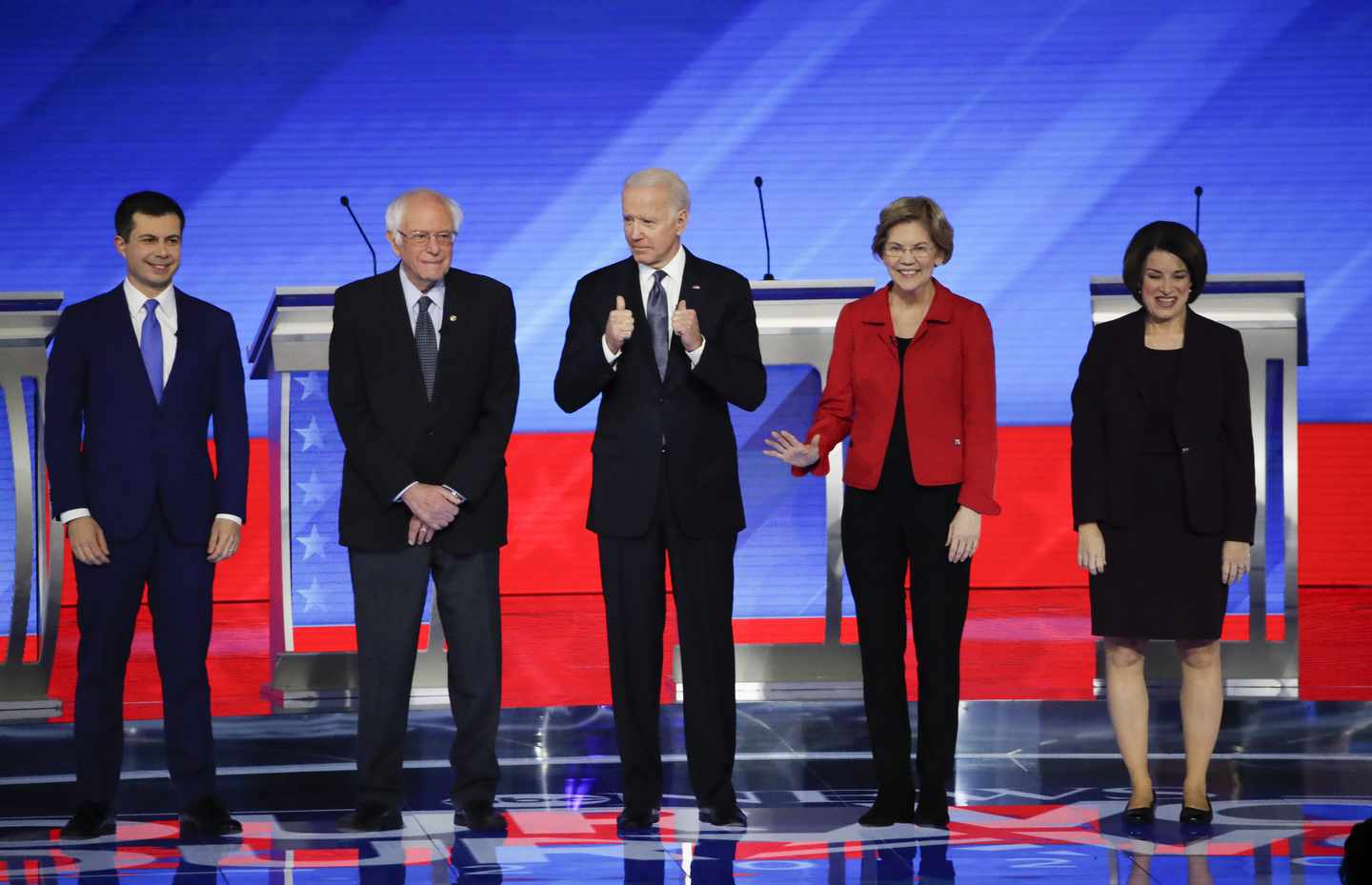Going Into N.H., Dems Struggle to Define Their Party's Direction
February 11, 2020#election2020 #BernieSanders #DemocraticParty #PeteButtigieg

The Democratic presidential race has remained stubbornly fluid, with their front-runner, Vermont Sen. Bernie Sanders, a seemingly unpalatable pick for the party establishment. Voters in Iowa and New Hampshire seem frustrated with their choices, fearing no one in the field has the strength or stamina to take on President Trump.
In New Hampshire, a Suffolk University survey shows the possibility of last-minute candidate shifts, even ground-shattering ones. A majority of likely primary voters said they either hadn’t made up their minds (12%) or they could change their minds (45%) at the last minute.
Democrats are on the verge of their own civil war: nominate a moderate candidate who has the ability to unite blue-collar workers in states like Pennsylvania or Michigan but isn’t polling well or swing wildly to the left and unabashedly back someone who isn’t even in their party – a self-avowed socialist like Sanders. Neither option seems to be sitting well with voters.
“We cannot nominate Bernie. If he’s the nominee, it’s a disaster,” Rep. Tim Ryan, an Ohio Democrat who endorsed former Vice President Joe Biden after dropping out of the presidential race, told Time magazine last week. “Socialism is not popular and would sink us.”
Indeed. Most voters view capitalism as better than socialism, according to an NBC News/Wall Street Journal poll released last week. But that hasn’t stopped Sanders’ momentum.
Former Chicago mayor Rahm Emanuel argued supporting Sanders could possibly sink the Democratic Party by isolating swing voters.
"The fact is, one of the threats to the party right now is a rupture in the core," Emanuel said on ABC's “This Week.” "We as a party, to win Arizona, to win Wisconsin, to win in Michigan and Pennsylvania, and to be viable in North Carolina, need a candidate who moves those swing moderate voters.”
Yet, no Democratic presidential candidate has finished lower than second in New Hampshire and has gone on to win their party’s nomination. That’s looking good for Sanders, who’s leading the state, followed by Pete Buttigieg, who virtually tied Sanders in the Iowa caucuses.
The great hope of Biden seems to have faded after his dismal fourth-place finish in the Hawkeye State, and during last week’s Democratic debate he practically conceded New Hampshire in his opening remarks.
The problem for Biden is clear: He often doesn’t know what state he’s in and his lack of energy on the debate stage has shocked even his more ardent supporters. He’s largely running as the heir apparent to Barack Obama but hasn’t even secured his endorsement. Biden’s fundraising is anemic, and after potentially suffering two early loses, how can he convincingly tell voters he’s the most electable in the field?
That leaves an opening, which Buttigieg seems to be capitalizing on. But don’t be fooled by his suave rhetoric. The former mayor of South Bend, Ind., is not the centrist answer. His record is weak – and, aside from casting himself as a moderate, his campaign promises cast him in a totally different light.
Buttigieg stops short of endorsing “Medicare for All” on the campaign trail, but does support a public option, which would eventually lead the way for a Medicare for All system. He says he doesn’t want to confiscate your guns, but he does want to license every one of them, leading to such a system. And on ABC’s “The View” last week he refused to answer whether he supported infanticide, leaving the door open to murdering babies up until the day they are born. Not to mention he wants to abolish the Electoral College – the same kind of system that arguably won him the Iowa caucuses.
Such policy mutations have led even the Sanders campaign to question Buttigieg’s authenticity. “He’s good with the turn-of-the-phrase, and he pitches what he thinks sounds good,” campaign manager Faiz Shakir told the Washington Times. “It’s our job to make sure that ... he’s being accurate. And it is accurate to say that he used to be for Medicare for All and no longer is.”
This has all left Democratic voters with a sense of unease.
“I’d like to vote strategically, but we Democrats are in disarray and I don’t know what strategic is,” Millie LaFontaine, a 69-year-old New Hampshire voter told Reuters. “I am afraid.”
“We’re a party in chaos,” Rep. Marcia Fudge, a Democratic congresswoman from Ohio, told Politico.
Democratic strategist James Carville was even more pointed, telling Vox, “It’s like we’re losing our damn minds.” On MSNBC he said he was “scared to death” that Democrats would blow the 2020 election, adding in an interview with the New York Times that “if the Democratic Party doesn’t come together, we’re going to lose the country.”
Resisting President Trump could provide a strong unifier for the Democratic Party – but it sure didn’t turn out votes for them in the Iowa caucuses. The president meanwhile had 32,000 caucus-goers turn out for an uncontested nomination, dwarfing the 8,000 that came out when George W. Bush ran for his second term.
Meanwhile, the president has soared to the highest approval rating of his term, with Gallup saying 63% of respondents approve of the work he’s doing on the economy.
Democrats should be scared. As they grapple with the direction of their party, with no clear vision of the future, Republicans have unified around President Trump and are energized to elect him for another four years. Unlike Democrats, with no clear message, ours is clear: Keep America Great.
Source: https://www.realclearpolitics.com/

